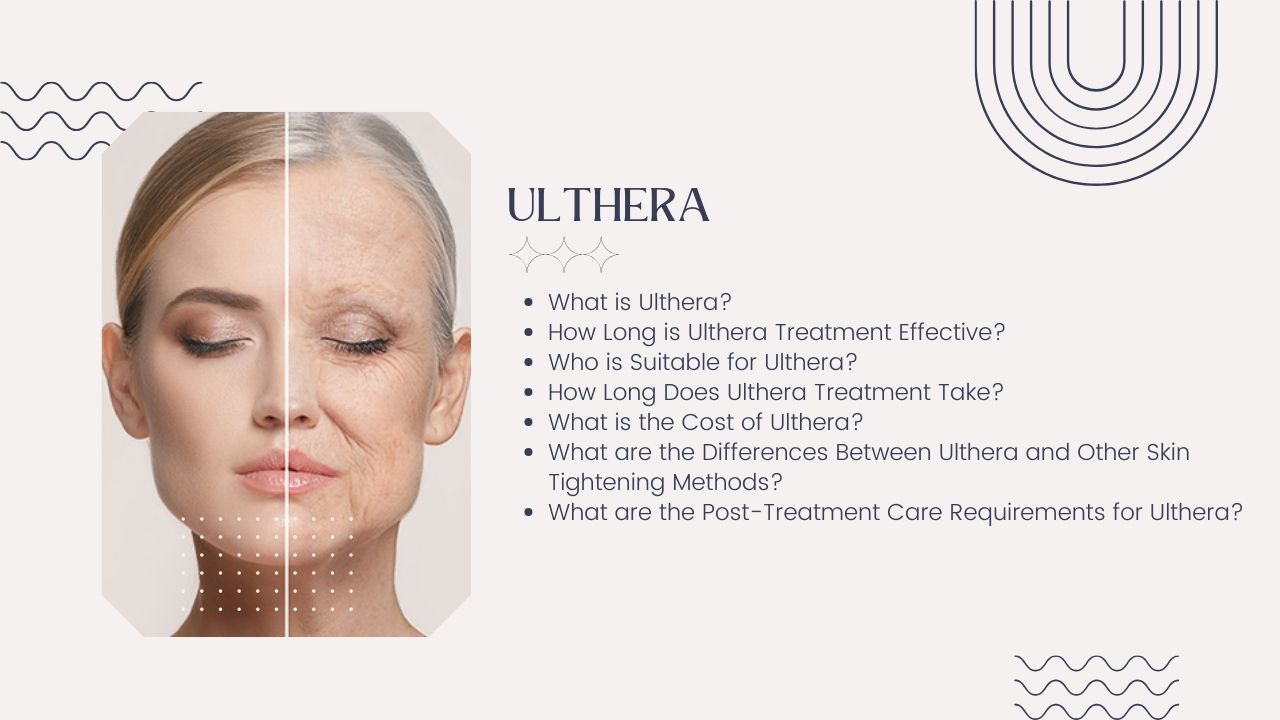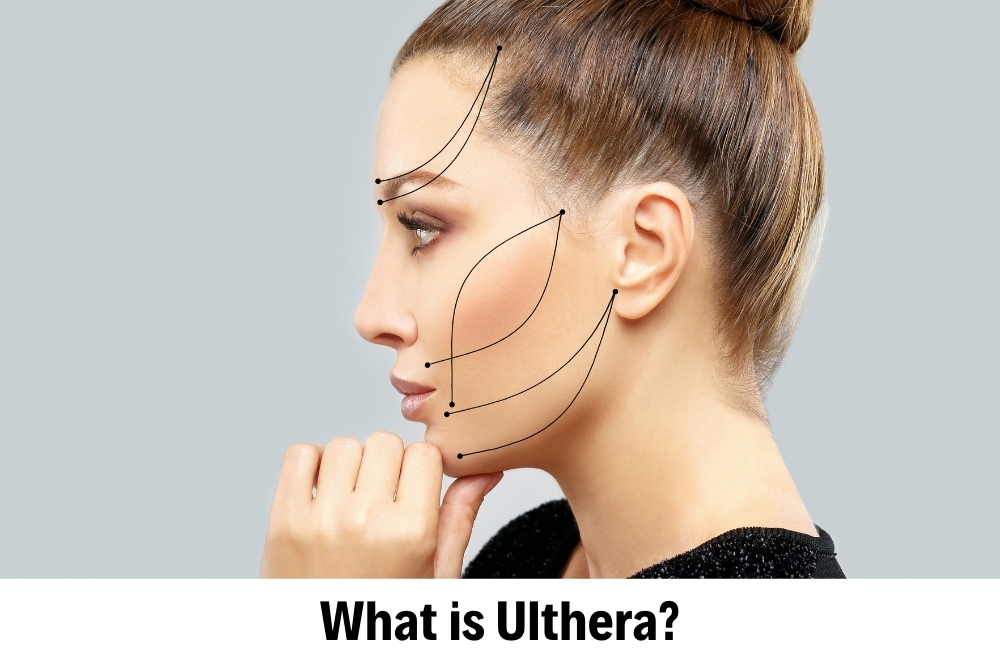Hello,
How Can We Help You?
Contact Form
Fill in the form and we will contact you as quickly as possible.
Contact us on Whatsapp
Scan with your camera app or click the QR code to start a conversation.



Ulthera is a non-invasive skin tightening and rejuvenation treatment. This treatment focuses on deep layers of the skin using high-intensity focused ultrasound (HIFU) technology. This focusing targets tissues beneath the skin and initiates the skin's natural rejuvenation process. Ulthera is effective in reducing sagging, wrinkles, and fine lines, and tightening the skin on the face and neck. This treatment is preferred because it is a non-surgical option. Additionally, it requires minimal recovery time post-procedure, and most people can return to their normal daily activities immediately. The effects of Ulthera usually become more noticeable over time, and visible results can be achieved even after a single session. It's a popular option for those seeking skin rejuvenation and tightening because it doesn't require surgical intervention and provides a natural appearance.

Ulthera treatment is generally a long-lasting skin rejuvenation and tightening method. The effectiveness of the treatment varies depending on factors such as the individual's age, skin type, characteristics of the treatment area, and personal skincare habits. However, typically, the effects of Ulthera treatment begin to be noticed within the first few months. Immediately after treatment, significant tightening and rejuvenation of the skin can be observed. This effect increases over time and can typically last between one to two years. While the effect may last longer in some individuals, it may be shorter in others. To maintain the effects of the treatment, regular care and repeated treatments may be recommended. Based on the individual's skin condition and desired outcome, doctors often recommend additional treatments at specific intervals post-treatment. However, the long-term effects of Ulthera treatment can vary depending on the skin's natural aging process and external factors, so individual results may vary.
Ulthera treatment is generally a suitable option for many individuals seeking skin tightening and rejuvenation. It is particularly effective for individuals showing signs of aging. Since the treatment is used to tighten and rejuvenate the skin, it is typically targeted towards individuals with issues such as skin sagging, wrinkles, and laxity. However, Ulthera treatment may not be suitable for everyone. Some individuals, such as pregnant or nursing women, those with skin infections or active skin diseases, those with a history of significant weight fluctuations, and those with certain health conditions may not be suitable candidates for treatment. However, typically, doctors assess the suitability for treatment based on the individual's medical history and skin condition. Anyone considering Ulthera treatment should consult a dermatologist or aesthetic specialist to determine if the treatment is suitable for them. Specialists can conduct a detailed assessment to determine the most suitable treatment plan based on the individual's needs and goals.

The duration of Ulthera treatment generally depends on the size of the area to be treated and the scope of the treatment. However, typically, an Ulthera treatment can last between 30 to 90 minutes. This duration usually varies depending on the size of the area to be treated, the condition of the skin, and the treatment plan. During treatment, high-intensity focused ultrasound (HIFU) energy is focused on specific depths beneath the skin, initiating the skin's tightening and rejuvenation process. There may be a slight discomfort during treatment, but it is generally not painful and does not require local anesthesia. After treatment, most people can return to their normal daily activities immediately. Some mild redness or swelling may occur post-treatment, but these usually subside quickly. Since Ulthera treatment is a procedure that requires minimal recovery time, many people can receive treatment without taking time off from work or daily activities. However, it is important to follow careful pre- and post-treatment care instructions to achieve the best results.
The price of Ulthera treatment can vary depending on several factors, including the size of the area to be treated, the scope of the treatment, the location of the clinic or health center, and the experience of the healthcare professional performing the treatment. Generally, the cost of Ulthera treatment can range from a few hundred to several thousand dollars per session. The cost of treatment is typically determined based on the number of areas to be tightened, and some clinics may offer package prices or discounts. To obtain accurate information about the price of treatment, it is important to contact a clinic or health center for a consultation appointment for potential Ulthera treatment. During the consultation, areas suitable for treatment can be identified, and a treatment plan can be established with a specialist. Additionally, some clinics may offer payment options or installment plans, making the cost of treatment more accessible.
Ulthera is a non-invasive method that differs from other skin tightening methods. This means that the treatment can be applied to the skin without surgical intervention. Ulthera uses high-intensity focused ultrasound (HIFU) technology.
This technology focuses on specific depths beneath the skin, initiating the skin's tightening and rejuvenation process. Other skin tightening methods include laser treatments, radiofrequency (RF) treatments, and surgical procedures.
Laser treatments use intense laser light to target skin issues, while radiofrequency (RF) treatments increase collagen production by generating heat beneath the skin. These methods also typically provide effective results, but they may not be as non-invasive as Ulthera and may require some recovery time.
Surgical procedures may offer more permanent results for skin tightening and rejuvenation, but they have disadvantages such as being invasive and having a longer recovery process. Ulthera stands out as a less discomforting option compared to other methods, with minimal recovery time. However, since everyone's skin type and needs are different, it's important to consult with a specialist to determine the most suitable treatment option.
In conclusion, Ulthera is highlighted as a non-invasive and effective skin tightening method, offering less discomfort and a quicker recovery process compared to other methods. However, since everyone's skin type and needs are different, consulting with a specialist is important to determine the most suitable treatment option.
Post-care for Ulthera treatment is important to optimize the effects of the treatment and support the skin's healing process. After treatment, slight redness, swelling, or sensitivity may occur on the skin, so it is important to be gentle with sensitive areas of the skin. Here are some post-care requirements for Ulthera treatment:
Sun Protection: The skin may be sensitive after treatment, so it is important to avoid exposure to the sun and use sunscreen products. Using a broad-spectrum sunscreen before going out can prevent skin damage.
Moisturizing: The skin may become dry after treatment, so it is important to use moisturizer. A light, fragrance-free moisturizer soothes the skin and supports the healing process.
Balanced Diet: Maintaining a diet rich in vitamins and antioxidants important for skin health can support post-treatment recovery.
Hydration: Drinking an adequate amount of water to maintain the skin's moisture balance is important. Water supports overall skin health and the healing process.
Following Doctor's Instructions: It is important to follow the doctor's post-care instructions carefully. These instructions may involve skincare products, activities, or additional treatments.
Monitoring the Healing Process: If any adverse reactions or complications are observed on the skin after treatment, it is important to consult a doctor immediately.
These post-care steps are important to maintain the health of the skin after Ulthera treatment and optimize its effects.
We'd love to hear from you. Please fill out the form.
Contact Form
Fill in the form and we will contact you as quickly as possible.
Contact us on Whatsapp
Scan with your camera app or click the QR code to start a conversation.